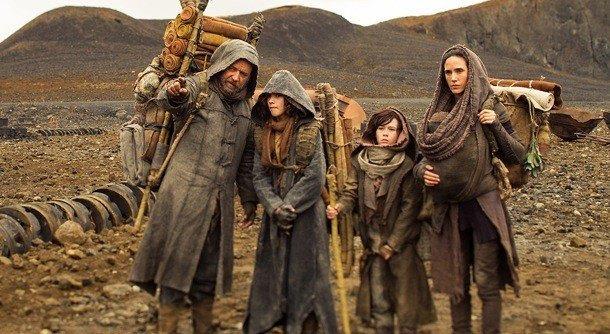
‘Noah’ is Darren Aronofsky’s interpretation of the popular Biblical story of a man in Earth’s earliest days tasked with a great purpose told in a fanciful manner packed with impressive production design, visual effects, and acting performances by Russell Crowe and Emma Watson. Unfortunately, without a strong script, ‘Noah’ doesn’t fulfill its heavy purpose.
Noah (Russell Crowe), through various visions and signs, is instructed by God (or, “the Creator”) to build an ark to protect his family and all of the animals from a storm he’s sending to destroy the Earth due to mankind’s wickedness.
As ‘Noah’ is entrusted to build this great fortress to helm all of these creatures, his faith in the Creator is tested. The world of Noah is that of a seemingly vast wasteland met with the occasional hill or mountain presenting the idea that building such a fortress would be an impossible feat. Nevertheless, the sequence that follows his initial agreement to take on this task is truly breathtaking as trees, grass, streams, and many of the resources needed for the task sprout from the ground. While we’ve gotten quite used to the idea of being surrounded by forests and trees (unless you live in a big city), the way this wildlife just appears out of nowhere is almost like seeing it for the first time. In this sense, the visual effects department for ‘Noah’ provides its audiences with a way to look at our Earth in a different light.
To add to the mundane task of sitting and waiting in the ark for the rain to stop, ‘Noah’ tells his family the story of Creation starting with a burst of light and describing each day according to the Bible. As he tells this story, the screen goes dim and immediately immerses us into this young and growing universe. Like many of the images flashing across our screen emphasizing the Earth’s beauty, we get a glimpse into how the Creator constructed everything. Cinematographer Matthew Labitque speeds up time to use as many images of wildlife, bodies of water, and animals as possible to beautifully illustrate each day as it’s described in Noah’s retelling.
Production Designer Mark Friedberg has conceptualized an impressive ark for this feature. Although we get glimpses of the vessel from the trailer, viewing it fully in the film only enhances its majesty. The production crew for ‘Noah’ is to be commended for their great efforts.
As ‘Noah’ sets the bar high this year with visual effects and cinematography, Editor Andrew Weisblum was clearly having a field day with cutting this film together. A theme that resonates throughout the film is mankind’s evil and barbaric nature. In a sequence in which one man strike’s another man with a rock, we see the same sequence repeated, but by different silhouettes representing the time period and/or countries fighting against each other. It is a well done and hard-hitting (pun unintended) wave of images showing our nature from the beginning of time.
In regard to acting performances, Russell Crowe’s and Emma Watson’s performances are powerful and reflect that of Aronofsky’s direction as well as their individual talents. We see Noah’s progression from subtle family man and gentle husband to a crazed servant as decision after decision in doing what he feels is just in God’s eyes is made. Crowe’s delivery in reflecting this shift in character is timely and effective, especially in scenes where he says very little.
If the most recent film that you’ve seen Watson in involves her attendance at a little place called Hogwarts, do not (by any means) enter ‘Noah’ with those films as the basis for her acting abilities. Her performance, especially in the climax of the film, is emotionally moving. Despite her condition, Ila sets an example of strength, and in the end, gets Noah to see something that he’s missed entirely. Given her performance here, she has a bright future in film ahead of her.
Although Aronofsky takes the basic story from the Bible, ‘Noah’ deviates quite a bit from the original story solely to add drama. However, to a certain extent—particularly with the character, Ham—this deviation backfires causing the story and, therefore, script logic altogether to fall apart. Like most young adult children, Ham doesn’t quite see eye-to-eye with a lot of Noah’s decisions, which only creates chaos. Since Tubal-Cain (Ray Winstone) was added to the story to account for this extra dose of entertainment, this move was unnecessary.
Additionally, it would have provided fewer problems at the end when his character does something even more nonsensical. ‘Noah’, while ending on a bittersweet moment, doesn’t quite conclude on a logical note. The earth having just been wiped out completely, with the exception of those who’ve inhabited the ark, presents a further problem for the state of mankind. The solution to this problem still remains as to—related to how it ends—how they’ll be able to do this very task. Again, this could have avoided had Aronofsky included additional minor detail from the original story (In ‘Genesis’, Noah’s three sons have wives. In ‘Noah’, not all are quite so lucky). Additionally, it might have also saved us some time as it is a 2 hour and 18 minute movie.
As spellbinding as the visual effects, cinematography, and some of the editing are in ‘Noah’, the story falls flat in parts towards the beginning when there seems to be a lack of direction as far as where the story is headed and towards the end leaving the experience of watching the film a bit incomplete and a little disappointing. ‘Noah’ is a film to experience for its dedication to physical presentation, but its script suffers from a lack of flow and maintenance.
Jim’s Rating: 6.5/10